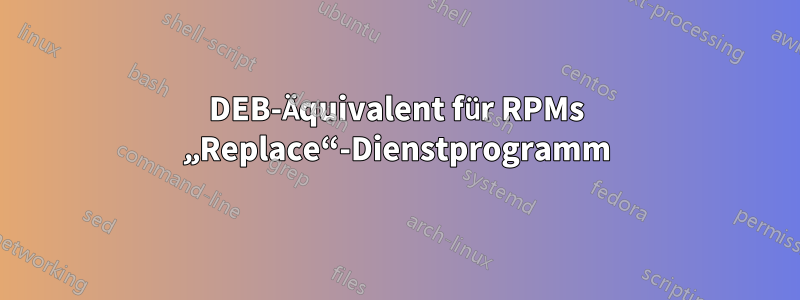
replaceIch verwende auf meinem CentOS-Server häufig den sehr praktischen Befehl:
Das Dienstprogramm „Replace“ ändert Zeichenfolgen direkt in Dateien oder auf der Standardeingabe.
Es ist kein eigenständiges Paket, nicht einmal auf der RPM-Seite, ich denke, es ist Teil eines größeren Dienstprogrammpakets. Wie auch immer, ich frage mich, ob es ein Ubuntu-Äquivalent dazu gibt. Ich weiß, ich kann mit grepund herumspielen sed, aber replacees ist viel bequemer.
Antwort1
Dies ist eine alternative Möglichkeit, die RPM-Datei replace 2.24nicht aus der Quelle alienzu installieren, da es sich um eine App handelt, die bereits Teil von Red Hat/CentOS ist.
Sie können die folgenden Zeilen gerne kopieren und in ein Terminalfenster einfügen.
cd /tmp
sudo apt install alien
wget https://extras.getpagespeed.com/redhat/7/x86_64/RPMS/replace2-2.24-1.el7.x86_64.rpm
sudo alien replace2-2.24-1.el7.x86_64.rpm
sudo dpkg -i replace2_2.24-2_amd64.deb
Führen Sie dann die neue App aus
$ replace2
replace 2.24 (C) Richard K. Lloyd 2004 - The sane person's alternative to sed
Syntax: replace2 [-?] [-A] [-b] [-c startcol] [-d tempdir] [-e] [-f]
[-h] [-i] [-L] [-l linenum] [-m maxreplines] [-n] [-P] [-p]
[-r|R] [-s] [-T] [-t maxtimes] [-u backupsuffix] [-v]
[-w] [-x suffix [-x...]] [-z]
old_str new_str [-a old_str new_str...] [filename...]
-? displays this syntax message.
-A forces the program to assume all files are text files. Normally, the first
256 bytes are examined to auto-determine if a file is text or binary.
This option is deprecated and may be changed or removed in a future release.
-a allows extra pairs of strings to be replaced in order.
-b forces the program to assume all files are binary files.
-c startcol starts the string replace from column 'startcol' rather than the
first column.
-d specifies the temporary directory for storing modified files. If not
supplied, the default directory is $TMPDIR or, if that isn't set, /tmp.
-e makes search case-sensitive. new_str exactly replaces old_str
with no case-adjustment to new_str.
-f forces the update of files without any .cln backup.
-h indicates that replacement pairs are binary hex data.
-i interactively prompts the user to confirm if they want strings replaced in
next file. Specifying -i -i switches to prompting for each replacement.
-L follows soft-links specified on the command line.
-l linenum starts the string replacement from line 'linenum' rather than the
first line.
-m maxreplines specifies the maximum number of lines in a file that should
have string replacements.
-n displays what strings would be replaced without actually replacing them.
It also switches on verbose mode.
-P pre-pads new_str with leading spaces if it is shorter than old_str.
-p pads new_str with trailing spaces if it is shorter than old_str.
-r or -R recurses down the current directory tree (if no filenames are given),
replacing strings in all files found. Use -x to narrow the recursion.
-s relaxes the condition that old_str has to match a 'word' i.e. it replaces
old_str even if it is a substring of a 'word'.
-T retains the timestamps of the original unmodified files.
-t maxtimes states the maximum number of times a string can be replaced
in any single line of a file.
-u backupsuffix specifies the backup suffix for the unmodified file.
-v increments (switches on) verbose mode, reporting a summary of replacements
if specified once and all replacements if specified twice (i.e. -vv).
-w recursively replaces strings in all Web-related source files in the current
directory tree. Equivalent to "-r -x .html -x .htm -x .asp -x .js -x .css
-x .xml -x .xhtml -x .shtml -x .jsp -x .php -x .php3 -x .php4 -x .pl".
-x suffix specifies a case-insensitive filename suffix to look for when
recursing. Multiple -x params can be supplied and have an "or" meaning.
-z Zero-terminate any binary replacement string.
Hoffe das hilft!
Antwort2
Die Pakete mariadb-server-10.1, mysql-server-5.7und percona-xtradb-cluster-server-5.7enthalten Versionen von replace, aber diese Versionen scheinen größtenteils alt und einige sind sogar veraltet.
Die Software hat eine Website namenshttps://replace.richardlloyd.org.uk, leider ist der Download-Link dort defekt, aber Sie können die neueste Version (aktuell 2.24) als .tar.gzDatei herunterladen vonHier: Scrollen Sie ganz nach unten und wählen Sie in der letzten Zeile „HTTP“ aus. Befolgen Sie diese Schritte, um replaceaus dieser Datei zu installieren:
Extrahieren Sie das
.tar.gzArchiv:tar xf replace-*.tar.gzWechseln Sie in das Verzeichnis:
cd replace-*/Die Installation erfordert
gmake, wird abermakein Ubuntu aufgerufen, erstellen Sie also einen symbolischen Link:sudo ln -s /usr/bin/make /usr/bin/gmakeLaufen
gmake:gmakeÄndern Sie den Shebang von
tests/runtestsinbash(weil es verwendetlet, wasshnicht hat):sed '1s/sh/bash/' tests/runtestsFühren Sie die Tests aus:
gmake testInstallieren Sie die Software, um
/usr/local/bin/replace:sudo gmake install
Sobald es installiert ist, können Sie den /usr/bin/gmakesymbolischen Link sowie das replace-N.NN/Verzeichnis und die .tar.gzDatei entfernen:
cd .. && rm -r replace-*/ replace-*.tar.gz && sudo rm /usr/bin/gmake


